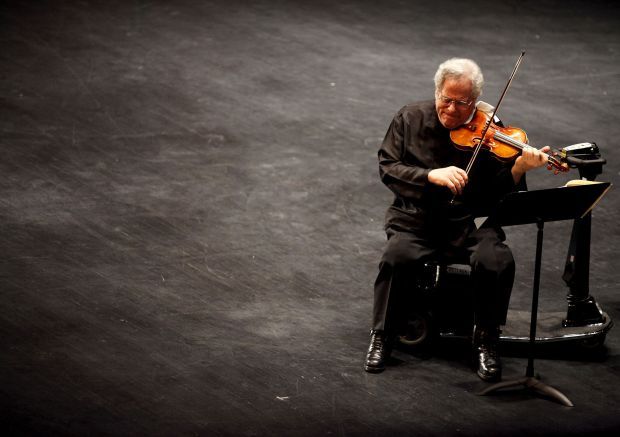He has performed the greatest masterpieces of the violin repertoire dozens of times in his 55-year-plus professional career, yet violin great Itzhak Perlman says he is constantly discovering new things whenever he picks up his instrument.
He is certain that will be the case when he plays Beethoven’s Violin Concerto with the Tucson Symphony Orchestra on Tuesday. It will be the first time in 30 years that Perlman has played with the TSO, although he has performed a number of recitals with UApresents in recent years.
We caught up with Perlman, 68, in Florida in mid-December to talk about the Beethoven and other things on his plate in the new year.
What is your relationship with the Beethoven Violin Concerto?
“Some people think, and I am among them, that that piece is the jewel in the crown of violin repertoire. It is the most difficult piece, really, because it is ... extremely difficult to play because it’s extremely transparent and relatively simple. ... It has a couple of nice tunes and a lot of arpeggios and scales, and that’s it. And when you talk about that, you say, ‘My God, how can something like this be so great?’ But it is.
“But the problem with playing scales and arpeggios is that you’ve got to make music. You’ve got to phrase, you’ve got to figure out harmonically what goes on. And there is no where to hide in a piece like that. If it’s done well, it sounds like it’s perfection, the way he wrote it.
“… I was 17 the first time I performed it. And it’s been an evolving process ever since, and it’s still evolving. ... I am never going to say ‘Ah, I did the piece the way I want to.’ It is yet another performance on the way to yet another performance. It never stops, and that’s what makes it so great. It’s not like, ‘Well I’ve done it; it’s now finished.’ ”
When you play a piece like the Beethoven, do you find yourself discovering new things about it and about yourself?
“Always. I am always discovering new things about the piece. As violinists, our repertoire, especially if you compare it to pianists’, we don’t have that much repertoire. So what we need is to really concentrate on what is in our repertoire. How do we make it sound fresh every time we play it? And I find that I am able to do that these days, which I suppose is maybe a sign of maturing. I have no idea. But I am discovering new things in every performance. So it’s a lot of fun to see what I will do today and what I will do tomorrow. And of course the whole thing is extremely subtle. It’s not like today I’m going to play it loud, tomorrow I’m going to play it soft. It’s these very subtle nuances that you do. And it’s also a different way of hearing. I always hear differently when I play a piece from one performance to another.”
More than 50 years into your career, what’s the most exciting part for you these days?
“That I’m not bored. That I can still go on stage and get excited by what I do. That’s really, basically a goal that I’ve reached: I am still excited by what I do. I also teach and conduct. So all these things — teaching, conducting and performing on the instrument — they all support each other.”
Would you ever consider conducting full time?
“I like the way things are right now. I am extremely fortunate to be able to conduct great, great orchestras. I think variety is always a terrific thing to have. … I am very happy with this combination.”
So you get to have your cake and eat it too?
“Oh, absolutely. It’s all interconnected. It’s fantastic.”
This summer you are introducing the four-day Bows & Batons festival in Saratoga Springs, N.Y. What will that be like?
“It’s just having a good time with an audience, talking about the music, talking about the process. Just spending time talking about what I do for a living and how it’s affecting my life. It’s going to be a lot of fun. I’ve done similar things to that, but with Q&As and talking and so on. But this is going to be a little bit more concentrated. It also involves being at a rehearsal and at a concert of me conducting the Philadelphia Orchestra. That’s always exciting for me to be conducting that orchestra.”
If I were to steal your iPod and hit play, what would I hear?
“You are probably going to hear some singers, maybe some lieder. You’re going to hear some rock and roll from the ‘50s and some very good symphonic music.”
What do you get out of performing with orchestras like the TSO that aren’t at the center of the cultural universe?
“It’s another concert of great music. I don’t have a thing where it’s different — I’m playing with a little orchestra so I’m going to give less. Every concert is as important as the other one. It’s always fun to hear different orchestras and to maybe help sometimes, make a comment to the string section sometimes, which they appreciate because I’m always nice about it.”





